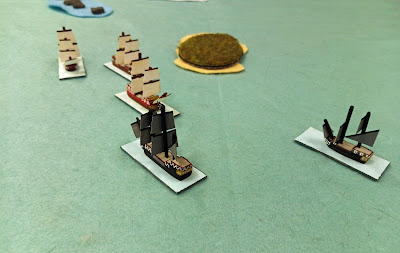We had a couple of games using the Pursuit scenario - three merchant galleons were stalked by a couple of pirate vessels.
I took the merchants in the first game, whilst Caesar ran the pirates.
Caesar deployed badly with regard to the island, shallows and wind, which meant that whilst my convoy simply had to broad reach across the table to reach its exit point (with one small course change to round the island), he had to run instead.
The result of this was that his best intercept point was very close to the point of exit, leaving him having to pull off a 'just in time' victory. In this picture the convoy has already negotiated the island, and is on a course for safety, whilst the pirates hadn't even got the targets in gunnery range.
Eventually Caesar brought the pirates in, and fired some shots
But the merchants were not without their own guns, and actually inflicted damage with their return fire, holing the smaller pirate vessel.
The smaller pirate ship took a battering from the merchant vessels, who very much had their act together.
The lead merchant ship escaped, but Caesar brought the larger pirate ship up and boarded the second merchant.
It quickly struck, but at the same time the crew of the smaller pirate vessel decided that they'd had enough of being the subject of the convoy's gunnery practice, and hauled down their colours as well.
The third merchant ship had a hairy moment when it sailed too close to its struck companion, and they both took damage in the ensuing collision. However this also took it along the opposite side of the struck merchantman, and allowed it a clear run to the exit point before the remaining pirate could engage it.
So Caesar captured one merchant vessel, but two escaped and had inflicted reasonable damage on the pirates. This was a win for the convoy.
We kept the same terrain, and swapped sides. Caesar ran the merchants to windward of the island and shallows. I brought the pirates in from the convoy's exit point, aiming to intercept the convoy as it was tied up with the minor course adjustments required to avoid the shallows around the island.
The pirates closed in far, using their chasers to try and inflict some hits as they did so. They didn't.
Both pirate ships grappled a merchant. The opponent of the smaller pirate quickly surrendered, but the larger pirate ship found itself up against a crew ready for a fight.
The smaller pirate ship came up in support, but its larger consort cravenly struck its colours before the two ships could combine to take down what would have been their second merchant. The merchant deftly cut the grapples, and escaped through the shallows. The third merchant ship was also running free as well.
All was not entirely lost for the pirates. The fat merchant ships were slow to turn, and Caesar had to make a few course changes to line them up on the exit point. In order to mitigate the risk of them sailing off the table if they failed any activations, he was obliged to reduce sail. This gave the smaller pirate ship, which turned more quickly, time to extricate itself from the shallows and turn on an intercept course.
One merchant escaped, but the other found itself under fire from the rapidly closing pirate's chasers. Sadly, though, the pirates were better at sailing than they were at shooting, and they couldn't slow the merchant's escape.
Once again, two merchant ships escaped, whilst the pirates captured one and took some damage. Another win for the forces of commerce. This second game was a closer one, though, with the big pirate ship being unlucky to strike. Has it not done so the capture of the second merchant ship was almost assured, which would have given the pirates a pretty convincing win.
Fun Fact: Most of the strikes were caused by rolling a '1' on coloured activation dice whilst grappled to an enemy ship. Rolling for activations with coloured dice whilst grappled is very risky.















No comments:
Post a Comment